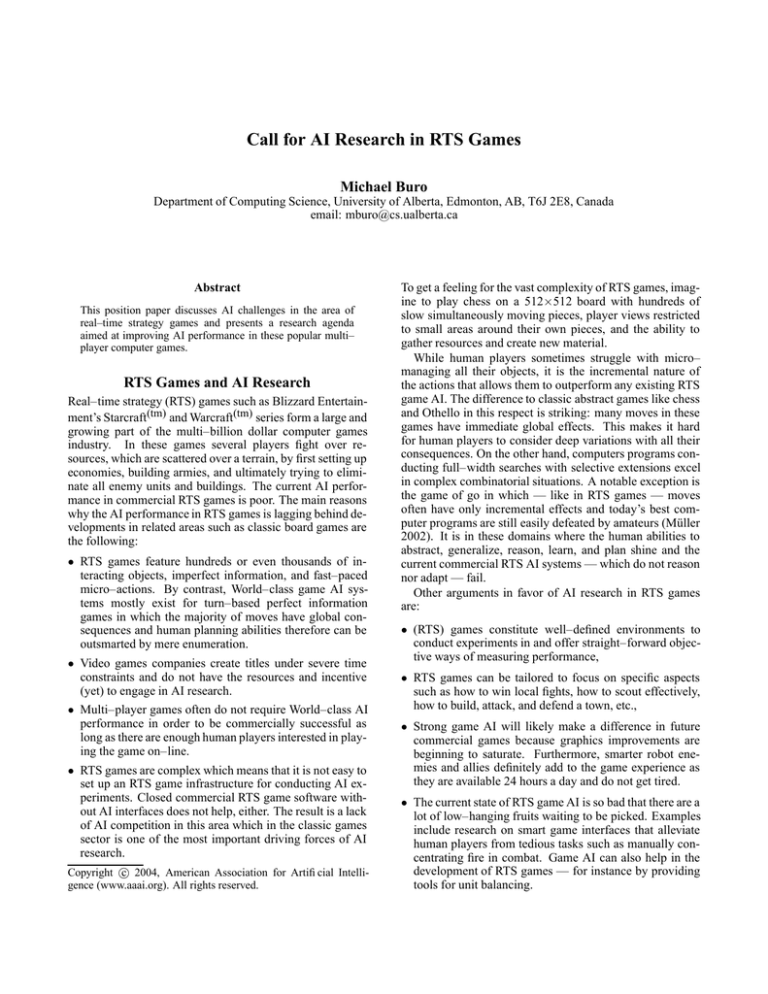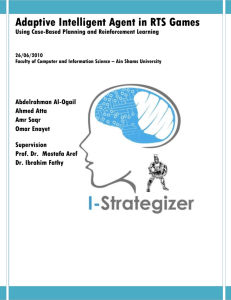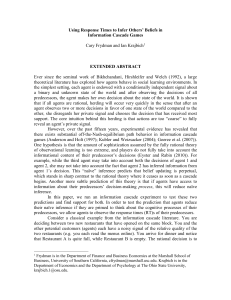
Call for AI Research in RTS Games
Michael Buro
Department of Computing Science, University of Alberta, Edmonton, AB, T6J 2E8, Canada
email: mburo@cs.ualberta.ca
Abstract
This position paper discusses AI challenges in the area of
real–time strategy games and presents a research agenda
aimed at improving AI performance in these popular multi–
player computer games.
RTS Games and AI Research
Real–time strategy (RTS) games such as Blizzard Entertainment’s Starcraft(tm) and Warcraft(tm) series form a large and
growing part of the multi–billion dollar computer games
industry. In these games several players fight over resources, which are scattered over a terrain, by first setting up
economies, building armies, and ultimately trying to eliminate all enemy units and buildings. The current AI performance in commercial RTS games is poor. The main reasons
why the AI performance in RTS games is lagging behind developments in related areas such as classic board games are
the following:
• RTS games feature hundreds or even thousands of interacting objects, imperfect information, and fast–paced
micro–actions. By contrast, World–class game AI systems mostly exist for turn–based perfect information
games in which the majority of moves have global consequences and human planning abilities therefore can be
outsmarted by mere enumeration.
• Video games companies create titles under severe time
constraints and do not have the resources and incentive
(yet) to engage in AI research.
• Multi–player games often do not require World–class AI
performance in order to be commercially successful as
long as there are enough human players interested in playing the game on–line.
• RTS games are complex which means that it is not easy to
set up an RTS game infrastructure for conducting AI experiments. Closed commercial RTS game software without AI interfaces does not help, either. The result is a lack
of AI competition in this area which in the classic games
sector is one of the most important driving forces of AI
research.
c 2004, American Association for Artificial IntelliCopyright gence (www.aaai.org). All rights reserved.
To get a feeling for the vast complexity of RTS games, imagine to play chess on a 512×512 board with hundreds of
slow simultaneously moving pieces, player views restricted
to small areas around their own pieces, and the ability to
gather resources and create new material.
While human players sometimes struggle with micro–
managing all their objects, it is the incremental nature of
the actions that allows them to outperform any existing RTS
game AI. The difference to classic abstract games like chess
and Othello in this respect is striking: many moves in these
games have immediate global effects. This makes it hard
for human players to consider deep variations with all their
consequences. On the other hand, computers programs conducting full–width searches with selective extensions excel
in complex combinatorial situations. A notable exception is
the game of go in which — like in RTS games — moves
often have only incremental effects and today’s best computer programs are still easily defeated by amateurs (Müller
2002). It is in these domains where the human abilities to
abstract, generalize, reason, learn, and plan shine and the
current commercial RTS AI systems — which do not reason
nor adapt — fail.
Other arguments in favor of AI research in RTS games
are:
• (RTS) games constitute well–defined environments to
conduct experiments in and offer straight–forward objective ways of measuring performance,
• RTS games can be tailored to focus on specific aspects
such as how to win local fights, how to scout effectively,
how to build, attack, and defend a town, etc.,
• Strong game AI will likely make a difference in future
commercial games because graphics improvements are
beginning to saturate. Furthermore, smarter robot enemies and allies definitely add to the game experience as
they are available 24 hours a day and do not get tired.
• The current state of RTS game AI is so bad that there are a
lot of low–hanging fruits waiting to be picked. Examples
include research on smart game interfaces that alleviate
human players from tedious tasks such as manually concentrating fire in combat. Game AI can also help in the
development of RTS games — for instance by providing
tools for unit balancing.
• Spatial and temporal reasoning.
Understanding the importance of static terrain features
like choke points and dynamic spatial properties such as
visibility and enemy influence is crucial for generating
successful plans in RTS games. Another important aspect is the temporal relationship among actions. To illustrate the necessity of spatial and temporal reasoning for
guiding decisions in RTS games consider the following
scenario in which a base is attacked and the defender’s
tank force is on its way to the attacker’s base. The decision on whether to return and defend the home base or to
proceed and destroy the attacker’s base depends partly on
how long it takes for the tanks to reach either location and
whether the tank force and local defenses are capable of
thwarting the attack. Combining terrain knowledge with
simple heuristics such as the air–distance lower bound is
often sufficient to pick the best course of action. Current
RTS game AI largely ignores these issues and falls victim
to simple common–sense reasoning (Forbus, Mahoney, &
Dill 2002).
• Finally, progress in RTS game AI is also of interest for
the military which uses battle simulations in training programs (Herz & Macedonia 2002) and also pursues research into autonomous weapon systems.
Research Agenda
The main goal behind the AI research being proposed here
is not to increase the entertainment value of RTS games, but
rather to create the strongest RTS game AI possible. The
former goal is pursued by the commercial games industry,
whereas the latter tries to push the cognitive abilities of machines to new levels. Note, however, that increased playing
strength can be converted into higher entertainment value
by adapting to the player’s performance level to keep games
challenging. Also, we acknowledge that commercial RTS
game AI often cheats to compensate for its lack of sophistication. Tricks of the trade include map revealing and faster
resource gathering. The resulting AI systems may outperform human players and may even create challenging encounters, but they do not advance our understanding of how
to create intelligent entities.
In order to repeat the classic game AI success in RTS
games, progress in the following key areas is required:
A continuing exponential hardware speedup will certainly
help to improve AI performance in RTS games. However,
without clever abstractions and algorithms — comparable
to the impact of the alpha–beta improvement over minimax search — fast progress is unlikely because of enormous
branching factors. Although eventually all of the problems
mentioned above have to be tackled, gradual improvements
can have tremendous effects. The idea is simple: because
current AI systems do not reach human planning, learning,
and reasoning levels, machines can at least aid them playing
RTS games. To some extent they already do (pathfinding and
default unit behavior). However, there are numerous other
ways of improving game performance which can be easily
integrated in RTS game interfaces. For example, when attacking a group of units, current RTS game often require
players to micro–manage their attack force in order to manually concentrate fire or to intercept fleeing units. It should
be possible to create AI modules to handle those local combat situations much more efficiently than humans who have
to point and click on units to give them orders. What makes
this hybrid AI approach attractive is that now human players can choose their favorite AI plugins. Moreover, players
then can concentrate on high–level decisions without being
forced to compete with the World’s fastest mouse virtuosos
in terms of speed. This in turn could lead to an AI arms race
provided the RTS game is popular. The hope is that the focus
of AI modules will then shift to higher–level tasks such as
orchestrating large–scale attacks on enemy fortifications or
securing resource locations. As more and more high–level
tasks can be delegated to AI modules, it is conceivable that
eventually the human RTS game player – even when aided
by AI – will be defeated.
Before this vision can become reality, the necessary infrastructure has to be developed. RTS game companies are
reluctant to add interfaces to their products which would allow researchers to play RTS games remotely and to gauge
the playing strength of RTS AI systems by means of tournaments. We therefore began in 2001 to create a free soft-
• Adversarial planning under uncertainty.
Because of the huge number of possible actions at any
given time and their microscopic effects in RTS games,
agents cannot afford to think at the game action level. Instead, abstractions of the world state have to be found that
allow programs to conduct forward searches in abstract
spaces and to translate found solutions back into the original state space. Human problem solvers conduct such
planning all the time, but programs are not that advanced
yet. Consequently, current RTS game AI systems can be
confused by simple maneuvers like flanking attacks and
diversions. All high–level decisions in RTS games such
as when to build what, where to scout, and where to extend and attack are based on search in abstract state spaces
augmented by beliefs about the world. Because the environment is hostile and dynamic, adversarial real–time
planning approaches need to be investigated. Without this
planning ability there is not much hope for RTS game AI
to defeat human players at the commander level.
• Learning and opponent modeling.
One of the biggest shortcomings of current (RTS) game
AI systems is their inability to learn quickly. Human players only need a couple of games to form accurate hypotheses about their opponents’ playing styles and weaknesses
and to exploit them in future games. New efficient machine learning techniques have to be developed to tackle
these important problems. Applied to RTS games, the resulting AI would be able to react to discovered tendencies
such as a bias towards air–force or turtling. One way to incorporate gathered information into the decision process
is to adjust beliefs formed by the planning module. Dynamic scripting which has been applied to a role–playing
game in (Spronck, Sprinkhuizen-Kuyper, & Postma 2003)
looks like a promising starting point.
2
available at www.cs.ualberta.ca/˜mburo/orts.
We are currently working hard on a software release featuring a multi–race standard ORTS game, a game portal similar
to Battle.net(tm) , and a highly customizable GUI complete
with client scripting support and animated 3d models.
Conclusion
In this paper we have motivated AI research in RTS games
and outlined a research agenda whose goal it is to produce
AI systems that reason, learn, and plan in this popular and
challenging domain.
We invite AI researchers to participate in creating and improving RTS game AI systems, to contribute to the ORTS
project, and to compete on-line. Competition is a powerful
driving force for AI innovation which has been witnessed in
the areas of classic board games, planning, and auctions. We
hope that it will also lead to strong RTS game AI and elevate our understanding of real–time decision making under
uncertainty.
Figure 1: A screen shot of the ORTS OpenGL 3d graphics interface. On the left–hand side a playfield sector is
displayed showing terrain features and game objects. The
right–hand side shows action buttons and the mini–map.
Acknowledgments
Thanks go to Tim Furtak and Keith Yerex for their important contributions to the ORTS project. This research is supported in part by grants from NSERC, Canada.
ware RTS game engine called ORTS [(Buro 2002) (Buro
2003), Fig. 1] with the following design goals:
References
Buro, M. 2002. ORTS: A hack-free RTS game environment. In Proceedings of the Third International Conference on Computers and Games, 156–161.
Buro, M. 2003. Real-time strategy games: A new AI research challenge. In Proceedings of the International Joint
Conference on AI, 485–486.
Forbus, K.; Mahoney, J.; and Dill, K. 2002. How qualitative spatial reasoning can improve strategy game AIs. IEEE
Intelligent Systems 17(4):25–30.
Herz, J., and Macedonia, M. 2002. Computer games and
the military: Two views. Defense Horizons, Center for
Technology and National Security Policy, National Defense
University 11.
Müller, M. 2002. Computer go. Artificial Intelligence
Journal 134(1–2):145–179.
Spronck, P.; Sprinkhuizen-Kuyper, I.; and Postma, E.
2003. Online adaptation of game opponent AI in simulation and in practice. In Mehdi, Q., and Gough, N., eds.,
Proceedings of the 4th International Conference on Intelligent Games and Simulation, 93–100.
• Server/client operation. The entire game state is only
known to the server which sends out individual views to
players. Thus, unlike any other RTS game currently available,1 ORTS is not prone to map–revealing hacks which
have become a serious problem for on–line tournaments.
• Flexibility. ORTS is an RTS game engine which allows
users to define all game properties using a script language.
This means that AI researchers can tailor ORTS games
towards particular research needs.
• Open protocol. In contrast to commercial RTS games, the
communication protocol between the ORTS server and
clients is open. Users can connect whatever client software they wish. This includes highly customizable GUIs,
AIs running on super computers, or hybrid systems.
• Total game control. Units are entirely controlled by the
client software. There is no built–in default behavior
which in other RTS games is often contra–productive
(e.g. automatically fired tank shells hurting friendly units)
or non–existent (meaning that players have to baby–sit
units). In the ORTS game model, clients can generate
a single action for each unit under their control in each
simulation cycle.
• Free software. Licensed under the GNU Public License
the ORTS source code is available and everybody is invited to study and improve it.
The ORTS software and articles that describe our AI research in RTS games and related work in more detail are
1
Including the free
(www.stratagus.org)
software
RTS
engine
Stratagus
3





